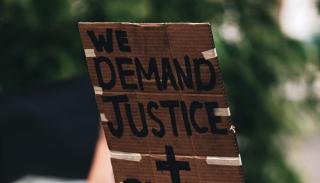
Breadcrumbs navigation
Black Lives Matter – a BISA statement on recent events
Ongoing events in the United States and in the UK over these past few weeks have reminded everyone, in dramatic fashion, of the perniciousness of institutionalised inequality, racism, and injustice. This is not new, nor is it centred in the United States. From legacies of colonisation and structures of white privilege, to the suppression of peaceful protests and state violence, we recognise that this is an issue that challenges key freedoms and has a significant impact on our members and their wider networks globally. As an organisation committed to supporting these freedoms and to supporting education and research in the field of International Studies, including serving the research and teaching needs of our members, we wholeheartedly stand in solidarity with the Black Lives Matter movement and its calls for systematic change.
While we look at these events with grave concern, we at BISA, and our larger membership, recognise that there is important work to be done at home. We recognise that racism and the reproduction of racist structures are not simply external to International Relations. Instead, our discipline is often deeply implicated in the kind of race work which upholds racist structures and relations — from the academic representation of racialised communities and areas of the world as uniquely deficient, to the reproduction and validation of far-right ideas, bringing these into mainstream social and political fields. Notwithstanding this, scholars of colour have spent many decades building institutional and disciplinary spaces in which the intellectual projects of racialised thinkers can thrive. Now is therefore also the time to remember and appreciate the ongoing institutional struggles of Black scholars in particular, as well as the importance and vitality of Black study in the field. Their work has extensively revealed the material implications of racist representations, but has gone well beyond this to reinforce the importance of reparation, redistribution, and abolition as more meaningful ways of breaking down structural racism. It is the responsibility of all scholars to follow their lead and continue the ongoing struggle against the racism that continues to define our discipline, the academy and the world beyond.
As a professional association representing the field of international studies, we therefore believe it is vital to the advancement of racial justice that expertise developed and disseminated from within our subject area, as well as serving the needs of all our members, continues to examine the ways in which inequality, racism, and injustice is embedded into British society, within UK Higher Education and within our own practices. We believe our field has a duty to uncover the range of injustices shaping British society and its projection abroad in the past, present and future, how these become manifest, as well as the ways in which they remain hidden from those not directly affected, facilitating their ongoing presence. This includes examining our own legacies and practices. As a discipline, and as a disciplinary society, we need to be more reflective about the role that our own work, and higher education more broadly, play in the reproduction of systemic inequalities. To these ends, BISA will be working to understand and address the following:
- The leaky pipeline of under-represented groups, including and especially those racialised as Black, in the profession;
- Best practice in mentoring and the professional development of underrepresented groups;
- Best practice in outreach and co-production with underrepresented groups;
- Learning, developing and promoting inclusive professional standards around leadership, teaching, publishing and conference organising within our discipline and beyond.
In the midst of this unprecedented time, we therefore commit to doing all that we can to learn and develop as an organisation, working towards stronger and more inclusive education and research in the discipline of IR and in UK Higher Education. For further information or to support our commitment to a more focused effort to redress inequalities within the profession, within International Studies and within BISA, please contact the BISA trustee and Equality, Diversity and Inclusivity Lead Dr. Elspeth Van Veeren: e.vanveeren@bris.ac.uk
Photo by LOGAN WEAVER on Unsplash